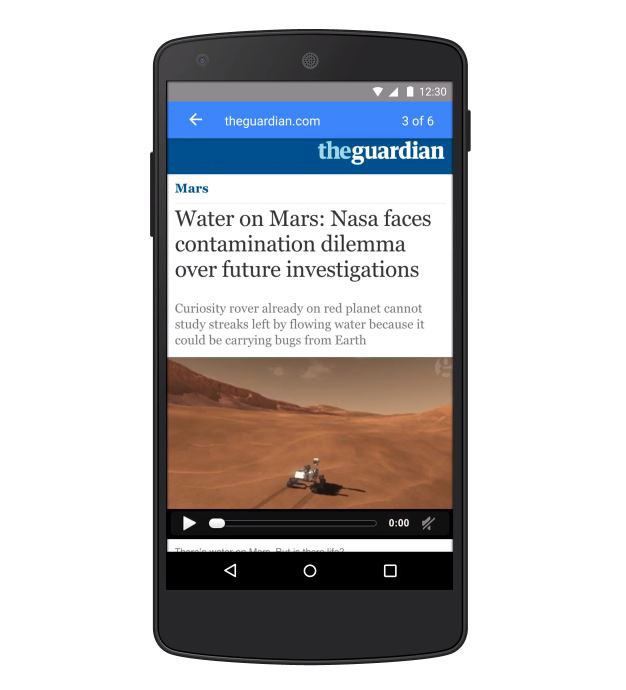Google on Wednesday announced a new open-source project dubbed Accelerated Mobile Pages, intended to increase the hits publishers receive on articles, and hence the public's exposure to advertising.
The company noted that whenever a page takes too long to load, readers tend to go elsewhere. In response it has developed AMP HTML, a multi-platform framework based on existing technologies. In theory the effort should allow "lightweight" mobile webpages which nevertheless have video, animation, still graphics, and ads.
An initial specification is being made available today through GitHub, and a demo has been produced for Google Search. Other Google products (like Google News) will incorporate AMP over time, and the company has signed up just under 30 publishers, plus other partners like Twitter, Pinterest, Wordpress, and Adobe Analytics.
Part of the AMP initiative involves a new caching strategy in which publishers can host their own content, but take advantage of Google's caching servers for faster distribution. Those servers are being made free to use.
Although most of Google's revenue is derived from advertising, the company is promising to support a wide variety of ad formats and networks, along with subscriptions and other paywalls. A caveat is that AMP-compatible formats can't harm the end experience.
 Roger Fingas
Roger Fingas


 Malcolm Owen
Malcolm Owen
 Christine McKee
Christine McKee
 Charles Martin
Charles Martin


 William Gallagher
William Gallagher
 Amber Neely
Amber Neely










26 Comments
What ha piece of crap, they're really starting to smell that people have had of enough of the turds they sell.
I remember having a discussion years ago with a friend about how HTML simply wasn't designed to handle all of the things it was being used for (i.e. dynamic, interactive content). The fact that many websites can grind mobile devices to a halt (both in terms of downloading and displaying) is proof of this. So, imo, trying to optimize HTML like this when it really needs a redesign feels like polishing a turd. But I guess it makes sense if all you're trying to do is ensure you can get ads in front of eyeballs quicker.
Help? Or just self-serving so Google can jam more advertisements on everyone's phone
Help? Or just self-serving so Google can jam more advertisements on everyone's phone
The idea behind what they're doing is summed up by this statement (from this page):
Basically, they're taking the subset of HTML used for static content (which is what most publishers are generating) and optimizing it in various ways. Optimizations which can't be made if you have to deal with all of the other stuff which has been shoehorned into HTML over the years (e.g. web pages which can modify themselves dynamically).
All of that sounds ok. The concern here is that, in order to gain some of these optimizations, you need to be using Google's caching servers. Which means they have a fair bit of control over how content is served up, and could leverage that to, say, prioritize their ads over others in subtle ways.
[quote]The company noted that whenever a page takes too long to load, readers tend to go elsewhere. In response it has developed AMP HTML, a multi-platform framework based on existing technologies. In theory the effort should allow "lightweight" mobile webpages which nevertheless have video, animation, still graphics, and ads.[/quote] Has it occurred to these clowns that mobile sites take longer to display because it has to load advertisements? I know I know, the whole point of this solution isn't to eliminate Googles business model, but to limit its unwanted side effects on the user experience.